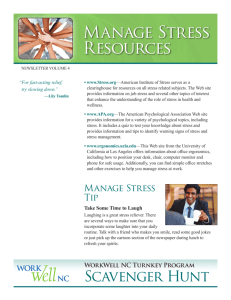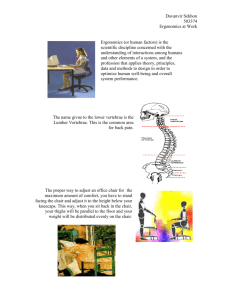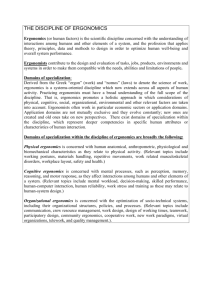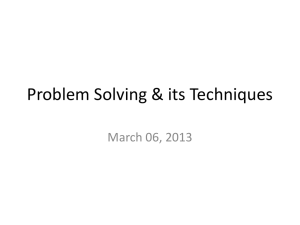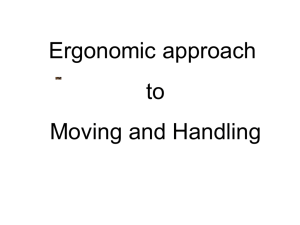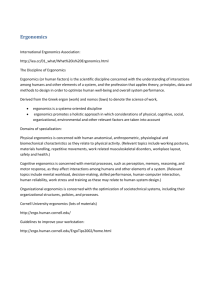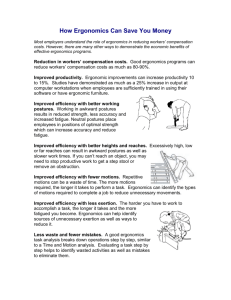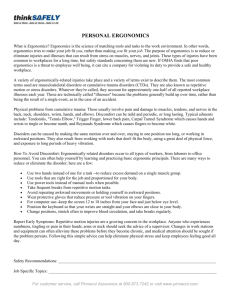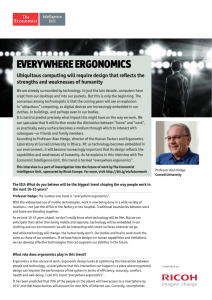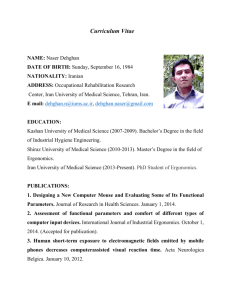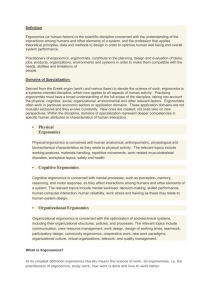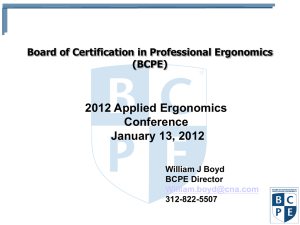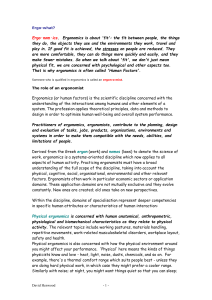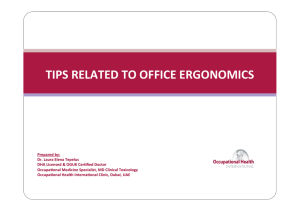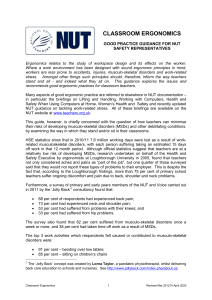Presentation from 1 October 2014 branch meeting
advertisement
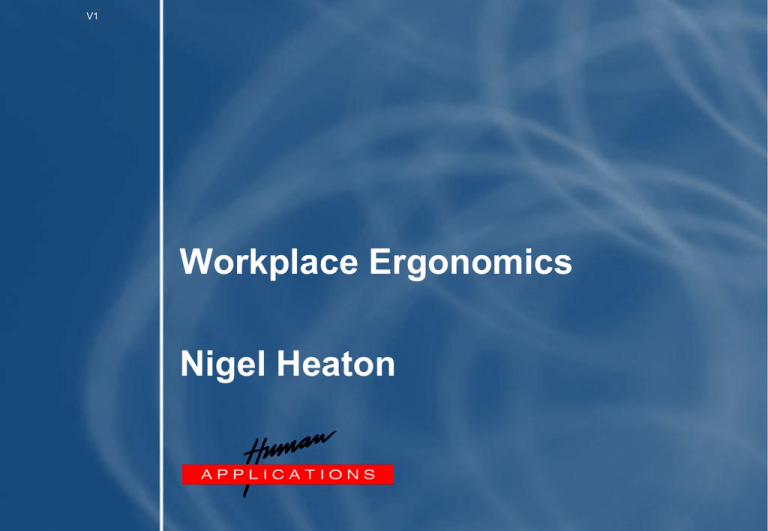
V1 Workplace Ergonomics Nigel Heaton What is ergonomics? • “ergon” = work, “nomos” = system or Law • Ergonomics (or human factors) is the scientific discipline concerned with the understanding of the interactions among humans and other elements of a system, and the profession that applies theoretical principles, data and methods to design in order to optimize human well being and overall system performance. (IEA, 2000) 1 Fitting to People • “Ergonomics produces and integrates knowledge from the human sciences to match jobs, systems, products and environments to the physical and mental abilities and limitations of people. In doing so it seeks to safeguard safety, health and well-being whilst optimising efficiency and performance.” (ISO, 1999) 2 People at work • Taylorism - ‘The principles of scientific management’ • Gilbreths - work study & ‘The Psychology of Management’ • Mayo (et al) 1927-1932, People are not machines • Maslow 1954 - people are more complex • Herzberg (et al.) 1959 - Motivators versus Hygiene factors 3 People have expectations Put the numbers 0 – 9 on the buttons 4 Which is “right”? 1 2 3 7 8 9 4 5 6 4 5 6 7 8 9 1 2 3 0 0 5 Ergonomics & the law • H&S Intervention (1990’s - the “six pack”) • Need to adopt an ergonomics approach • Not just DSE & MHO • PUWER – it’s about “use”; PPE – it’s about “fit” • Even the original Mgt. Directive – “take an ergonomics approach” • Litigation (Personal injury claims) • The RSI debate • Stress 6 Questions an Ergonomist asks • • • • • “Who?” “Doing what?” “With what?” “Where?” “Why?” 7 Physical characteristics of people Anthropometry • Anthropometry - the study of body measurements (e.g. size, strength, weight). • Anthropometric data exists for many measurements. • Data changes over time (we are all taller & fatter). • Data is population specific (e.g. young vs old; US vs English). 9 Use of anthropometric data • Understanding body shape affects sales (e.g. ‘Petite’ ranges; car design). • Fundamental to design • How high should a door be? • What range of adjustment should we provide? • But note difference between ‘static’ and ‘dynamic’ dimensions (e.g. arm length v. reach envelope). 10 What is normal? 11 Musculoskeletal problems • Upper limb pain • Referred to as musculoskeletal disorders (MSDs) • Sometimes referred to as ‘RSI’ (Repetitive Strain Injury) • MSDs should include: • Back & neck pain • Leg & foot pain 12 Wrist angles 13 Working above shoulder height 14 Reaching and twisting 15 Heights for standing workstations • Task dependent 16 Impact of working angle Angled work surfaces can give enormous benefits, but are often impractical. 17 Sit/stand workstations Trying to achieve the best of both worlds 18 Good workstation design? What are the right questions? 19 Using tools Task and tool factors must be considered. The aim is to achieve the best compromise 20 Materials presentation and workstation layout Fundamental design problems 21 Work height The real working height isn’t necessarily bench height 22 Work height & layout issues Reducing Manual Handling problems 23 Layout problem What questions should have been asked by whom, when, and with what in mind? 24 Work equipment Work equipment orientation 26 Work equipment usability Increasing usability through design 27 28 A classic control/display issue Which hob control works which ring? Which stereotypes fit? Why? A B C D Design this better w x y z 29 30 31 Simple solutions • Work need not be a problem • Simple intervention is cost effective and easy to do • Deal with problems, if you ignore them they will get worse • Apply basic ergonomics principles 32 Final thoughts • People are influenced by all sorts but mostly… • You can write their scripts 33 Ergonomics information and references General reference web sites • The Institute of Ergonomics and Human Factors Society • www.ergonomics.org.uk • IOSH • www.iosh.co.uk • HSE • www.hse.gov.uk • Chartered Institute of Building Surveying Engineers • www.cibse.org • Croner • www.croner.cch.co.uk • Suzy Lamplugh Trust • www.suzylamplugh.org/ • Department of Health • www.doh.gov.uk • European Agency for S+H @ Work • //agency.osha.eu.int • RSI association • www.rsi-uk.org 35 Contact details Human Applications The Elms Elms Grove Loughborough Leics LE11 1RG UK tel: ++ 44 1509 211866 (01509 211866) fax: ++ 44 1509 218344 (01509 218344) e-mail: enquiries@humanapps.co.uk www.humanapps.co.uk 36
